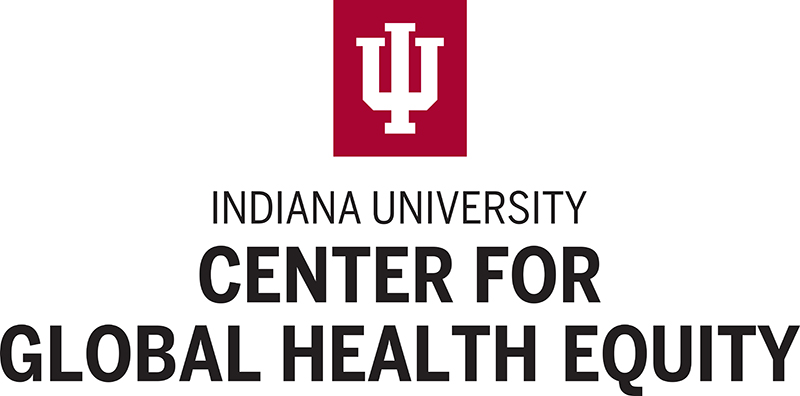The Indiana University (IU) Center for Global Health is embracing its history of global health equity work and is making a name change. For more than a decade, the Center has focused on addressing healthcare inequities and global challenges through long-term, equitable, and mutually beneficial partnerships in Indiana and around the world. Now the Center’s name will more closely align with its mission by adding the word “Equity” to its moniker.
“This name change reflects the Center’s long-standing commitment to addressing health inequities whether that is in sub-Saharan Africa or in rural or urban Hoosier communities,” said Dr. Adrian Gardner, MD, MPH, director of the IU Center for Global Health Equity and associate dean for global health for the IU School of Medicine. “Health and well-being go beyond the absence of illness, and we are committed to addressing the cultural, structural, social, economic, mental, and emotional determinants of health in the populations where we have partnerships.”
IU is a leader in global health care, education and research and has worked closely with academic, government and community institutions in Kenya for more than three decades in a partnership known as the Academic Model Providing Access to Healthcare (AMPATH) Kenya. The Center also serves as the secretariat for AMPATH Global which includes new partnerships in Ghana, Mexico and Nepal. The AMPATH partnerships reflect the Center’s underpinning philosophy of leading with care by prioritizing and being responsive to the needs of the population.
“Academic global health partnerships have the potential to improve health outcomes around the world but improving health equity must begin with equity in partnership. Historically, many global health collaborations have been characterized by power imbalances, low trust, inequitable institutional partnership benefits and lack of respect for the populations being served. We must all commit to approaches that empower leadership by local communities and institutions,” said Dr. Gardner. The development of the new AMPATH sites has included an intentional commitment and focus on creating equitable partnerships that reflect AMPATH’s values.
In its work with domestic and international partners, the Center promotes the principle of “reciprocal innovation” which is defined as a bi-directional and iterative exchange of a technology, methodology, or process between countries to address a common health challenge. “Lessons learned through implementation of service, educational and research programming in global settings can and should help inform interventions in the U.S. and other high-income countries,” said Kara Wools-Kaloustian, MD, director of research for the Center. “But just as important, lessons learned from interventions and programs developed or refined in high-income countries should be shared with low- and middle-income countries to advance global equity in health.”
An example of reciprocal innovation is Indiana’s WeCare program to reduce infant mortality, led by Deb Litzelman, MD, director of education for the Center. “WeCare uses a community health worker model based on Kenyan maternal and child health programs to provide support to mothers and babies in communities at highest risk for infant and maternal mortality in Indiana,” said Dr. Litzelman. “Community health workers who come from the communities they serve are often more trusted and more successful than the traditional healthcare system in educating and supporting pregnant women and new mothers,” she added. The Indiana Department of Health has recently renewed funding for WeCare for an additional two years based on the success of this model.
The IU Center for Global Health Equity supports these reciprocal innovation initiatives in partnership with the Indiana Clinical and Translational Sciences Institute (CTSI) through grants and other mechanisms. The Global Health Innovation Exchange catalogs examples and past grant recipients of the initiative. To date, Indiana University, Purdue University and University of Notre Dame investigators have been provided $710,000 dollars for 32 reciprocal innovation projects in 10 countries.
Laura Ruhl, MD, MPH, director of reciprocal innovation for the Center, stressed that collaboration within IU and partner institutions is important to maximize efforts to improve health equity. “We hope to collaborate with faculty, local partners and communities to respond to the needs of rural and urban communities and co-create innovative solutions to address social determinants that influence health disparities,” she said. “We want to demonstrate how reciprocal innovation can be a tool used to create and advance solutions aimed at improving access to and quality of care and incorporated into global health courses and training programs for the next generation of local and global healthcare leaders.”
The IU Center for Global Health Equity is planning a Global Health Scholars Day and Faculty Retreat on May 12 and 13, 2023. Global Health Scholars Day showcases the excellent work being done by the IU community to improve the care of patients worldwide, research the complexities of global health, and educate learners about the care of local and global populations. The day will begin at noon with a global health focused edition of Department of Medicine Grand Rounds presented by Roger I. Glass, MD, PhD, senior scientist emeritus and former director of the Fogarty International Center at the National Institutes of Health. Poster presentations and the opportunity for those interested in global health throughout the university to network and share information will follow from 1-3 p.m.
On Saturday, May 13, a full-day retreat at Bradford Woods aims to engage global health faculty to better understand current needs, strategize about solutions and facilitate new connections. The retreat will include a plenary session, themed break-out sessions, and opportunities to connect with other IUCGHE affiliated faculty. Faculty members from throughout the university who are engaged in care, training or research activities in resource-limited settings are encouraged to become affiliated faculty members of the Center.
“As we have learned through 30 years of partnership in Kenya, we always accomplish more when we work together,” said Dr. Gardner. “As the IU Center for Global Health Equity we hope our mission to improve health through collaboration across the university, the state and the world is now better reflected in our name.”



